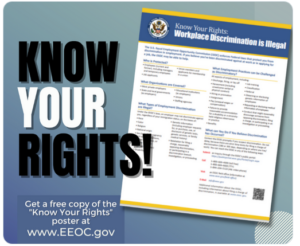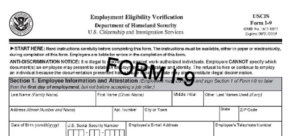EEOC UPDATED WORKPLACE DISCRIMINATION POSTER
The EEOC laws pertaining to discrimination in the workplace governs employers with 15 or more employees. In addition, covered employers regulated by the federal Age Discrimination in Employment Act (ADEA) are those employers with 20 or more employees.
For covered employers, the EEOC recently released a new version of its required workplace poster “Know Your Rights: Workplace Discrimination is Illegal.” This poster replaces the current mandatory poster, “EEO is the Law.”
While no deadline for replacing the new poster has been published, employers should replace the posters as soon as possible, along with updating other posters for 2023.
As with all postings, this poster should be placed in a conspicuous location in the workplace where employees can easily access it. The EEOC also encourages employers to post this notice electronically or send to each employee via email for those employees working remotely and employees who do not regularly visit a physical worksite.
The posters can be found here:
“Know Your Rights: Workplace Discrimination is Illegal” poster
“Know Your Rights: Workplace Discrimination is Illegal” poster (Spanish)
UPDATED CALIFORNIA FAMILY CARE & PREGNANCY DISABILITY LEAVE POSTER
First, California employers should be aware that the Department of Fair Employment and Housing is now named the California Civil Rights Department (CRD). Along with this re-naming of the agency, many of the required posters have been updated.
The “Family Care & Medical Leave & Pregnancy Disability Leave” poster and the “Your Rights and Obligations as a Pregnant Employee” posters have been updated as of September 2022.These notices (which apply to California employers with 5 or more employees) must be posted and must also be given to an employee who is seeking pregnancy disability leave or reasonable accommodation/transfer for pregnancy, childbirth or related medical condition and/or who is seeking family care or medical leave. Employers are also encouraged to give this notice at time of hire to each new employee.
A copy of the posters can be found here:
Family Care & Medical Leave & Pregnancy Disability Leave
Pregnancy Disability Leave Notice
PAID FAMILY LEAVE & SDI BENEFITS INCREASED
Senate Bill 951 (Senate Bill 951) signed into law on September 30, 2022, provides for increased benefits for workers taking Paid Family Leave (PFL). Paid Family Leave provides partial income replacement payments for employees who seek to take time off work to 1) care for a seriously ill family member; 2) bond with a new child; or 3) participate in a qualifying event because of a family member’s military deployment.
Workers applying for PFL benefit can receive paid leave for up to eight weeks – the income replacement currently provides for 70% of wages for workers making $27,000 or less (low wage earners) and 60% for all others.
SB 951 increases, from 60 to 90 percent, the share of workers’ wages paid by the State Disability Insurance/Paid Family Leave program for those in lower-wage jobs, effective January 1, 2025. SB 951 will pay for the increased benefits via increased contributions on payroll taxes for Californians earning above $145,600. The increases do not require any additional business contributions but rather are funded entirely by the increased payroll taxes.
Employees can also apply for State Disability Insurance (SDI) benefits if they are disabled and unable to work. Employees must apply for the benefit with the EDD.
INCREASED COMPENSATION RATE FOR COMPUTER PROFESSIONALS
Effective January 1, 2023 the minimum wage for exempt computer professionals must meet new salary thresholds which are increased by 7.6%, compared to the 2022 rates. The compensation rates are adjusted annually to account for inflation according to the California Consumer Price Index (CPI) for Urban Wage Earners and Clerical Workers.To qualify for the California computer professional exemption, starting January 1, 2023, California employers must pay their computer professional employees a salary of at least $112,065.20 annually ($9,338.78 monthly) or an hourly wage of $53.80 every hour worked.
Duties Test Remains Unchanged
- The application of systems analysis techniques and procedures, including consulting with users, to determine hardware, software, or system-functional specifications.
- The design, development, documentation, analysis, creation, testing, or modification of computer systems or programs, including prototypes, based on, and related to user or system design specifications.
- The documentation, testing, creation, or modification of computer programs related to the design of software or hardware for computer operating systems.
The California computer professional must also be highly skilled and proficient in the theoretical and practical application of highly specialized information to computer systems analysis, programming, or software engineering.Moreover, the duties test generally requires the computer professional to be primarily involved in work that is intellectual or creative and that requires the exercise of discretion and independent judgment. The Labor Code also specifies certain duties that do not qualify.
Standard For Federal Exemptions Differs From California Test
The California test for computer professionals differs from the federal regulations under the Fair Labor Standards Act (FSLA) so employers must be aware of both tests. Under federal law employees in computer-related occupations must meet a salary of at least $684 per week ($35,568 per year) or an hourly wage of $27.63 per hour to qualify for the federal exemption.
Employers with computer professionals in their workforce across multiple states should consider how they will address pay rates across different states, especially since the new California computer professional exemption salary is now greater than the salary threshold of $107,432 for the federal highly compensated employee exemption, which provides another avenue for exemption outside of California.
I-9 FORMS & REMOTE WORKERS
 With the onset of COVID in 2020, the U.S. Department of Homeland Security (DHS) allowed employers to verify the documentation provided by an employee for completion of the I-9 form virtually. On October 11, 2022, DHS along with the U.S. Immigration and Customs Enforcement (ICE) announced the Form I-9 document inspection flexibilities were extended until July 31, 2023.
With the onset of COVID in 2020, the U.S. Department of Homeland Security (DHS) allowed employers to verify the documentation provided by an employee for completion of the I-9 form virtually. On October 11, 2022, DHS along with the U.S. Immigration and Customs Enforcement (ICE) announced the Form I-9 document inspection flexibilities were extended until July 31, 2023.
Under these guidelines, employers whose workforce is operating remotely may inspect the Section 2 identity and employment eligibility documentation remotely — via video link, fax or email, for example — within three business days of hire, and the employer must retain copies of these documents.
This provision only applies to employers and workplaces operating remotely — no exceptions will be made if employees are physically present at a work location. Once normal business operations resume, employees whose documents underwent remote verification must report to their employer within three business days for official in-person document verification.
This Newsletter is intended as a brief summary of employment law. While every effort has been made to ensure the accuracy of the information contained herein, it is not intended to serve as “legal advice,” or to establish an attorney-client relationship. If additional information is needed on any of the topics contained herein, please contact our office. All rights reserved. ©2022.

